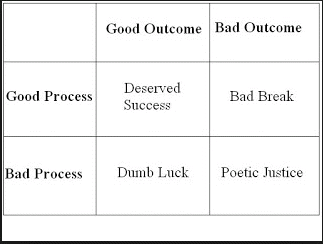What is more important? The OUTCOME of a decision regardless of the PROCESS that generated it? Or the PROCESS applied to generate the OUTCOME regardless of the results?
The answer can reveal the strengths and possible weaknesses of how we manage the information used to define our trading edge and the significance we place on the results of that trading edge. For instance, if I were to share two trader’s trading results the last month and one showed a drawdown of 5% and the other a profit of 20% could we determine that the process used to generate the former’s loss is flawed while the process used to generate the latter’s is not? Does the outcome necessarily imply that a viable process was used? What if the 20% was generated without a solid trading process?
Let’s say the trader got lucky as a result of holding the soon to expire call options of a company that was bought out, generating a 150% options gain on a position that initially was written off as a 100% options loser (the trader chose not to exit the trade at his initial stop loss but held on in the “hope” that the trade would eventually work before expiration). In this case the process was flawed, as the trader was holding a losing position before pure luck saved him. On the other hand, the trader who experienced the 5% drawdown did so by following the well defined rules of his process, which is based on the probability that over time his specific trading edge will generate consistent profits (regardless of good or bad luck). His process factors in the possibility of loss while acknowledging the probability of consistent gains over time (as his trading account over the last 12 months would reveal).
J. Edward Russo and Paul J.H. Schoemaker discuss the Process vs Outcome decision making process in their book entitled WINNING DECISIONS: GETTING IT RIGHT THE FIRST TIME. Russo and Schoemaker use the following illustration to drive home the point that “your best hope for a good decision outcome is a good decision process” (3).

As traders, we would do ourselves a great injustice if we focused more on the outcome at the expense of a well defined process. Might I suggest an in depth study of the book mentioned above along with the following articles on the importance of the process?
If you focus your attention and effort less on the results you’re hoping for and more on the processes and techniques you use, you will learn faster, become more successful, and be happier with the outcome.
If you’re committed to behavioral change in the long-term, having goals isn’t enough. You have to be committed to the process of taking action on a consistent daily basis.
But investors often make the critical mistake of assuming that good outcomes are the result of a good process and that bad outcomes imply a bad process. In contrast, the best long-term performers in any probabilistic field — such as investing, sports-team management, and betting — all emphasize process over outcome.
It doesn’t really matter what the methodology is, so long as it begins with some objective input, runs through a process of sorts, and determines an output.
Most investors don’t spend much time thinking about their investing process – it all tends to be somewhat ad-hoc based on a hot tip here or a chance new idea there.
If you find yourself stuck or blocked in your life in any area, look inside to see if your focus is on the outcome and on what people think of you, or if you are focused in the present moment, fully engaged in the process.
Commit to a simple process you believe in. Hint: usually it’s the simple ones that actually work.
Now, let’s go work on that process shall we?
David Blair
THE CROSSHAIRS TRADER
www.thecrosshairstrader.com
*no relevant positions
